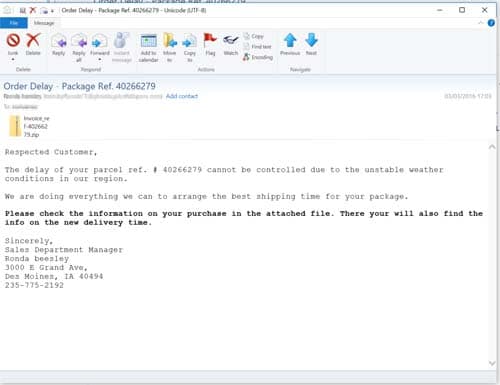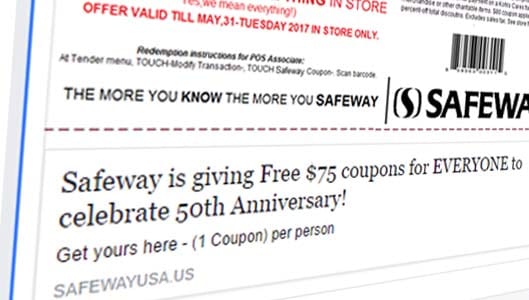The 10 online scams to watch out for before Christmas 2017
Christmas time is a potential goldmine for cyber crooks. Every year an unprecedented number of shoppers turn to the Internet in search for the best festive deals, and this in turn provides scammers with plenty of opportunities.
Here are the 10 scams you need to be on the lookout for this year.
Malicious “attached invoice” emails
Scams that try and trick email recipients into opening dangerous email attachments are on the rise during Christmas, especially ones that ask you to open an attached invoice. After all, scammers know that more people than usual will be making online purchases at this time than any other time of the year. In this case, the attached “invoice” is actually malware. This is how the particularly nasty ransomware often spreads, so ensuring you don’t fall for these scams is vital.
To avoid these scams…
Never open email attachments unless you were specifically expecting them.
Malicious “courier instructions” emails
This one is extremely similar to the above example… however in this case the attached email will apparently contain something related to a courier company, such as a delivery notice, courier instructions or a “failed delivery” notice. Again, this is because scammers know that more people than usual will be expecting parcels to arrive at this time of year.

To avoid these scams…
Again, never open up email attachments unless you know what it is. If you’re unsure, contact the courier company directly if you are expecting something.
Sponsored Content. Continued below...
Online websites selling fake or counterfeit goods
With Christmas and Black Friday, there are more people shopping at this time of the year than normal. Long gone are the days when a well-designed, fully functional e-commerce website must be legitimate. Pre-packaged, all-done-for-you e-shop templates are available for anyone to purchase at minimal cost, meaning just about anyone with an Internet connection and some rudimentary technical know-how can create their very own professional online store.
This means that just because a site looks professional, it doesn’t mean it is. There are plenty of websites operating from places like Russia, China or Africa that are in the business of selling counterfeit goods or will simply take your money and ship you nothing.
To avoid these scams…
Try to stick to websites you know and trust, and if you do want to purchase something from a site you don’t know, do your research first! Go to the WHOIS website and see if the website has been around for a while and avoid websites that have only been created recently. Use Google and see if the website has any feedback (no feedback is a bad thing!) Remember that poor spelling or grammar is a big red flag. Also, never make a payment through Western Union or MoneyGram and remember that credit card has the best protection when buying things online.
Also remember, if it appears too good to be true, it probably is!
Free voucher scams

Typically spread through social media, these scams claim to offer a free voucher for Christmas from a popular brand. These offers may often appear to have been posted by a friend. However these are usually scams aimed at directing victims to spammy marketing websites that are in the business of collecting your personal details so they can spam you incessantly.
To avoid these scams…
If a brand is offering a Christmas promotion, it will be from their official social media channels and their own website. Don’t trust links or offers that take you to third party websites.
Sponsored Content. Continued below...
Facebook “share this post” to win scams
Facebook posts offering various prizes (like festive holidays) for liking and sharing a post are extremely popular at this time of the year. Such posts are set up by pages looking to trick you into following them so they can target you with other scams.
To avoid these scams…
By extremely cautious of posts asking you to share them to win a prize, since this is against Facebook’s terms of service. This is especially true when you don’t know the people behind the Facebook page, i.e. it isn’t the official page of a known brand or local business.
Continued below...
Thanks for reading, we hope this article helped, but before you leave us for greener pastures, please help us out.
We're hoping to be totally ad-free by 2025 - after all, no one likes online adverts, and all they do is get in the way and slow everything down. But of course we still have fees and costs to pay, so please, please consider becoming a Facebook supporter! It costs only 0.99p (~$1.30) a month (you can stop at any time) and ensures we can still keep posting Cybersecurity themed content to help keep our communities safe and scam-free. You can subscribe here
Remember, we're active on social media - so follow us on Facebook, Bluesky, Instagram and X
